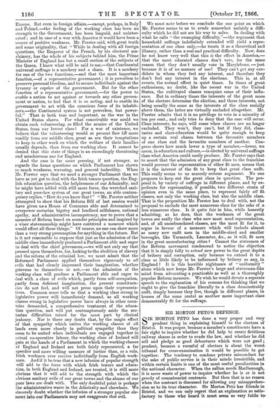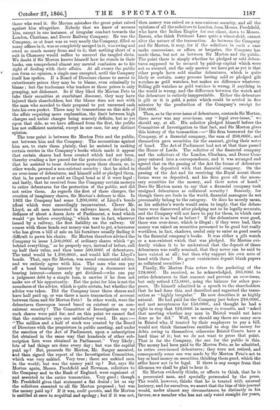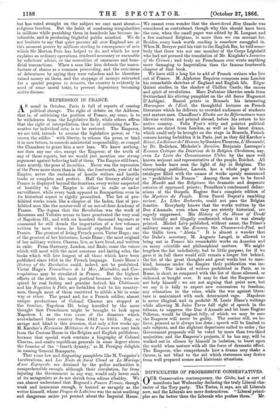SE MORTON PETO'S DEFENCE.
SIR MORTON PETO has done a very proper and very prudent thing in explaining himself to the electors of Bristol. It was proper, because a member's constituents have a fair right to inquire whether he did help to create fictitious railway shares in order to evade the law, and whether he did sell and pledge as good debentures which were not good ; prudent, because a roomful of electors is about the worst tribunal for cross-examination it -would be possible to get together. The tendency to condone private misconduct for the sake of public service is in their minds irresistible, and_ within certain limits is -one of the most useful peculiarities in the national character. When the maim needs Marlborough, it is mere waste of power to inquire whether he is or is not greedy of commissariat contracts. But then that is no reason when the contract is discussed for allowing any misapprehen-- sion as to its true character. Sir Morton Peto has friends in Bristol, and we can only regret that an explanation so satis- factory to those who heard it must seem so very futile to
those who read it. Sir Morton mistakes the great point raised against him altogether. Nobody that we know of accuses him, except in one instance, of irregular conduct towards the London, Chatham, and Dover Railway Company. He was the Company, or at least was so very nearly the Company, filled so many offices in it, was so completely merged in it, was owing and owed so much money from and to it, that nothing short of a suit in Chancery would suffice to unravel the tangled skein. We doubt if Sir Morton knows himself how he stands in their books, can comprehend almost any mental confusion as to his right of dealing with their affairs. At all events the public can form no opinion, a single case excepted, until the Company itself has spoken. If a Board of Directors choose to assent to extortionate prices they may be to blame, even criminally to blame ; but the tradesman who tenders at those prices is only grasping, not dishonest. So if they liked Sir Morton Peto to take their securities at exorbitant discount, they may have injured their shareholders, but the blame does not rest with the man who acceded to their proposal to put unearned cash into his own pocket. There may be transactions on this side of the affair requiring more explanation, the limit between high charges and unfair charges being scarcely definite, but as yet upon that side, as we have affirmed from the first, the public has not sufficient material, except in one case, for any distinct opinion.
The true point is between Sir Morton Peto and the public, not between him and the Company. The accusations against him are, to state them plainly, that he assisted in making certain entries in the Company's books which made it appear that certain shares had been created which had not been, thereby evading a law passed for the protection of the public ; that he assisted to issue debentures upon these shares, or, in other words, pawned a non-existent security ; that he aided in an over-issue of debentures, and himself sold or pledged them, that is, he pawned or sold an illegal bond as if it were legal ; and lastly, that he received from the Company certain moneys to retire debentures for the protection of the public, and did not retire them. As regards the first of these charges, the creation of imaginary shares, Sir Morton's defence is this. In 1863 the Company had some 1,200,0001. of Lloyd's bonds afloat which were exceedingly inconvenient. Clever Mr. Lloyd, as all men interested in railways know, devised, in defiance of about a dozen Acts of Parliament, a bond which would "go before everything," which was in fact, wherever issued by a railway, the first liability on the railway. Of course with those bonds out money was hard to get, a borrower who-has given a bill of sale on his furniture usually finding it difficult to pawn his chairs. Sir Morton therefore advised the Company to issue 1,500,0001. of ordinary shares which "go behind everything," as he properly says, instead of before, call up half their value, and then issue 500,0001. of debentures. The total would be 1,200,0001., and would kill the Lloyd's bonds. That, says Sir Morton, was sound commercial advice, and we entirely agree with him. The man who can pay off a bond bearing interest by issuing a document not bearing interest—shares only get dividend—who can pay a judgment debt by a simple loan, is unwise if he does not make use of his opportunity. But the point for him is not the soundness of the advice, which is quite certain, but whether the advice was taken. Did the Company issue those shares and have half paid up, or was there a mere transaction of account between them and Sir Morton Peto ? In other words, were the debentures thereupon issued based on existent or on non- existent security ? The Committee of Investigation say no such shares were paid for, and on this point we cannot find that the contractor says one satisfactory word. He says :— " The million and a half of stock was created by the Board of Directors with the proprietors in public meeting, and under the sanction of the Act of Parliament, upon a subscription list obtained in the same way that hundreds of other sub- scription lists were obtained in Parliament." Very likely ; lots of bad things are done every day ; but was the capital paid up But, proceeds Sir Morton, Mr. Surgey assented, and then signed the report of the Investigation Committee, which was very unkind. Very true ; there are unkind men in the world; but was the money paid up ? But, says Sir Morton again, -Messrs. Freshfield and Newman, solicitors to the Company and to the Bank of England, were cognizant of and assented to the entire transaction. Very good ; though Mr. Freshfield gives that statement a fiat denial ; let us say the solicitors assented to all Sir Morton proposed ; but was the money paid up I If it was, cadit qucestio, and Sir Morton is entitled at once to acquittal and apology ; but if it was not, then money was raised on a non-existent security, and all the opinions of all the solicitors in London, from Messrs. Freshfield,
who have the Indian Empire for one client, down to Messrs.
Baroni, who think Petticoat Lane quite a wheat-field, cannot alter the nature of the transaction. As between the Company and Sir Morton, it may, for if the solicitors in such a case make concessions, or offers, or bargains, the Company has made them, but not as between Sir Morton and the public.
The point there is simply whether he pledged or sold deben- tures supposed to be secured by paid-up capital which were not so secured, and the only answer we have got as yet is that other people have sold similar debentures, which is quite likely or certain, many persons having sold or pledged gilt watches as gold watches, but makes no difference whatever.
Selling gilt watches as gold watches is wrong, if anything in
the world is wrong, and the difference between the watch and the debenture is entirely inappreciable. Either the debenture
is gilt or it is gold, a point which could be settled in five minutes by the production of the Company's receipt for 750,0001.
Then, as to the over-issue of debentures, contends Sir Morton, there never was any over-issue, any " legal over-issue," we should say, at all. His solicitor pledged himself before the Committee of Investigation to that fact, and Sir Morton gives this history of the transaction :—" His firm borrowed for the Company, of a financial company, the sum of 200,0001., and themselves gave securities for the amount, giving their notes of hand. The Act of Parliament had not at that time passed the House of Lords. The solicitor of the financial company and the solicitors of the London, Chatham, and Dover Com- pany entered into a correspondence, and it was arranged and agreed that on the passing of the Act the forms of debenture should be deposited with that financial company. On the passing of the Act and its receiving the Royal assent those forms were so deposited, and his firm gave all the neces- sary securities for the money, . and their notes of hand." Does Sir Morton mean to say that a financial company took unsigned debentures as collateral security ? Scarcely, for though there are fools in the world, financial managers do not presumably belong to the category. Or dOes he merely mean, as his solicitor's words would seem to imply, that the deben- tures were discovered after pledging not to be legally accurate, and the Company will not have to pay for them, in which case the matter is as bad as before ? If the debentures were good, there was over-issue, which is illegal ; if they were bad, then money was raised on securities presumed to be good but really worthless, in fact, shadows, useful only to enter as good assets in the financial company's books. It was either a gilt watch or a non-existent watch that was pledged. Sir Morton evi- dently wishes it to be understood that the deposit of these debentures was really nominal, that they never can be said to have existed at all ; but then why support his own note of . hand with them ? Do great contractors deposit blank papers as collateral securities ?
Finally, Sir Morton Peto refers to the pocketing of the 128,0001. He received, as he acknowledged, 303,0001. to retire debentures to that amount and prevent an over-issue, but only retired 175,0001., using the balance for other pur- poses. He himself admitted in a speech to the shareholders that he had done this, and described and regretted the trans- action as " highly irregular." He now describes it as highly natural. He had paid for the Company just before 210,000/.,
and met acceptances for 150,0001., and thought he had a right to atop that 128,000/. in money in transitu, and "asked
that meeting whether any man in Bristol would not have done as he did." Well, we should say there are many men in Bristol who, if trusted by their employers to pay a bill, would not think themselves entitled to stop the money for debts owing to themselves, otherwise Bristol Courts have a hard time of it; but we do not want to press that point. That is for the Company, the one for the public is this. The money had been paid to Sir Morton Peto, as he admitted, to retire over-issued debentures ; they were not retired, and consequently some one was made by Sir Morton Peto's act to buy or lend money on securities, thinking them good, which the seller knew not to be legal. If there is any escape from that dilemma we shall be glad to hear it.
Sir Morton evidently thinks, or affects to think, that he is a persecuted man, and specially persecuted by the press. The world, however, thinks that he is treated with unusual leniency, and for ourselves, we assert that the bias of this journal would, under almost any circumstances, be distinctly in his favour, as a member who has not only voted straight for years,
but has voted straight on the subject we care most about— religious freedom. But the habit of condoning irregularities in millions while punishing them in hundreds has become in- tolerable, and is producing frightful public mischief. We do not hesitate to say that quiet persons all over England are at this moment poorer by millions sterling in consequence of acts which Sir Morton Peto has helped to do, and which he now explains as ordinary operations, rendered necessary or excusable by solicitors' advice, or the necessities of enormous and bene- ficial transactions. When a man like him defends the manu- facture of shares as a common proceeding, and the over-issue of debentures by saying they were valueless and he therefore raised money on them, and the stoppage of moneys entrusted for a special purpose in transitu, the country is evidently in need of some moral tonic, to prevent degeneracy becoming active disease.




































 Previous page
Previous page